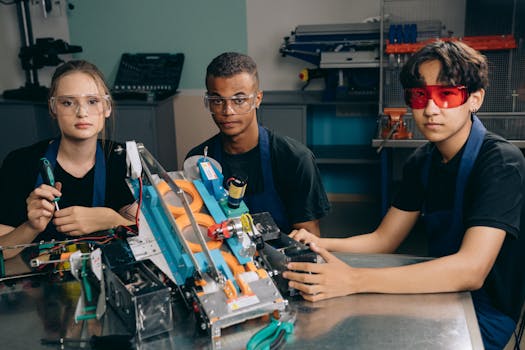
The Future of Work: Trends to Watch in 2025
The Future of Work: Trends to Watch in 2025 is an essential topic for businesses, employees, and individuals looking to stay ahead of the curve. The future of work is undergoing significant changes, driven by technological advancements, shifting workforce demographics, and evolving employee expectations. In 2025, we can expect to see continued growth in remote work, increased adoption of artificial intelligence, and a greater emphasis on work-life balance.
Section 1: Introduction to the Future of Work

The concept of work has undergone significant transformations over the years. From the industrial revolution to the digital age, each era has brought about new challenges and opportunities. As we enter the year 2025, it’s essential to examine the trends that will shape the future of work. In this article, we’ll explore the key trends to watch in 2025, including remote work, artificial intelligence, and work-life balance.
Remote Work: The New Normal

Remote work has become increasingly popular in recent years, and it’s expected to continue growing in 2025. With the advancement of technology, employees can now work from anywhere, at any time. This shift has brought about numerous benefits, including increased flexibility, reduced commuting time, and improved work-life balance. However, it also presents challenges, such as communication breakdowns and social isolation.
Artificial Intelligence: The Future of Work

Artificial intelligence (AI) is revolutionizing the way we work. From automating repetitive tasks to enhancing decision-making, AI is transforming industries and job roles. In 2025, we can expect to see increased adoption of AI in various sectors, including healthcare, finance, and education. While AI presents numerous opportunities, it also raises concerns about job displacement and the need for workers to develop new skills.
Section 2: Emerging Trends in the Future of Work

In addition to remote work and AI, several other trends are emerging in the future of work. These include the gig economy, upskilling and reskilling, and diversity, equity, and inclusion. The gig economy, for example, is expected to continue growing, with more workers engaging in freelance or contract work. Upskilling and reskilling are also becoming essential, as workers need to adapt to new technologies and job requirements.
The Gig Economy: A New Era of Work

The gig economy is a labor market characterized by short-term, flexible work arrangements. This trend is driven by the rise of platforms such as Uber, Airbnb, and TaskRabbit. In 2025, we can expect to see continued growth in the gig economy, with more workers engaging in freelance or contract work. While the gig economy offers flexibility and autonomy, it also raises concerns about job security and benefits.
Upskilling and Reskilling: The Key to Success

As the job market evolves, workers need to develop new skills to remain relevant. Upskilling and reskilling are becoming essential, as workers need to adapt to new technologies and job requirements. In 2025, we can expect to see increased investment in employee training and development programs, as well as a growing demand for online learning platforms and courses.
Section 3: The Impact of the Future of Work on Society

The future of work will have a significant impact on society, from the way we live and work to the way we interact with each other. In 2025, we can expect to see increased focus on work-life balance, mental health, and social connections. The future of work will also require policymakers and business leaders to rethink traditional employment models and social safety nets.
Work-Life Balance: A Priority in the Future of Work

Work-life balance is becoming increasingly important, as employees seek to balance their professional and personal lives. In 2025, we can expect to see increased emphasis on flexible work arrangements, employee well-being, and mental health support. Employers will need to prioritize work-life balance to attract and retain top talent, as well as to improve productivity and job satisfaction.
Mental Health: A Growing Concern in the Future of Work

Mental health is a growing concern in the future of work, as employees face increasing pressure and stress. In 2025, we can expect to see increased focus on mental health support, including employee assistance programs, mental health days, and stress management training. Employers will need to prioritize mental health to create a healthy and supportive work environment.
Section 4: Preparing for the Future of Work

To prepare for the future of work, individuals, businesses, and policymakers must take proactive steps. This includes investing in employee training and development, adopting new technologies, and rethinking traditional employment models. By working together, we can create a future of work that is equitable, sustainable, and fulfilling for all.
Investing in Employee Training and Development

Investing in employee training and development is essential for preparing for the future of work. This includes providing opportunities for upskilling and reskilling, as well as supporting employees in their career development. By investing in employee training and development, businesses can improve productivity, retention, and job satisfaction.
Adopting New Technologies

Adopting new technologies is critical for preparing for the future of work. This includes investing in AI, automation, and other digital technologies. By adopting new technologies, businesses can improve efficiency, reduce costs, and enhance customer experiences.
Section 5: Conclusion

In conclusion, the future of work is undergoing significant changes, driven by technological advancements, shifting workforce demographics, and evolving employee expectations. In 2025, we can expect to see continued growth in remote work, increased adoption of artificial intelligence, and a greater emphasis on work-life balance. By understanding these trends and taking proactive steps, individuals, businesses, and policymakers can prepare for a future of work that is equitable, sustainable, and fulfilling for all.





